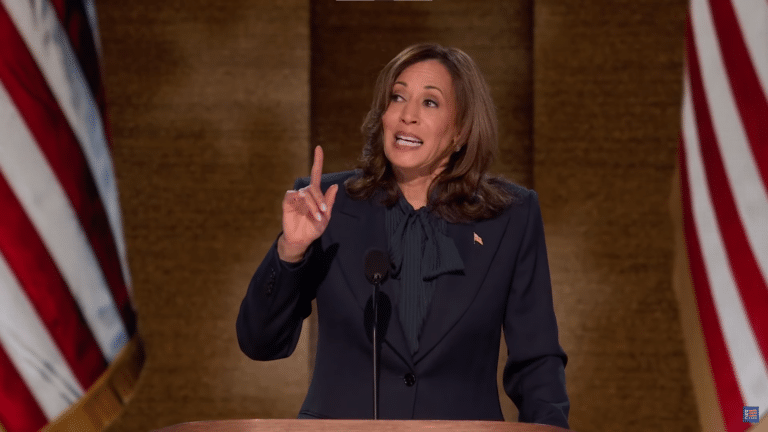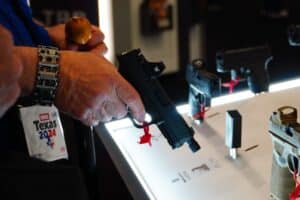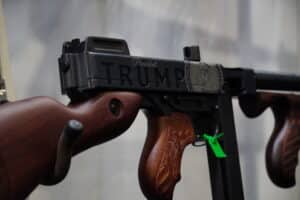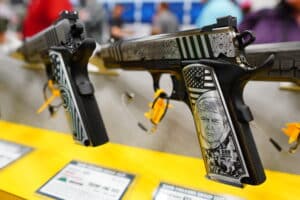Vice President Kamala Harris supported a 2005 ballot measure that banned San Francisco residents from possessing pistols.
The Democratic presidential nominee backed Proposition H in her role as the city’s District Attorney at the time. The measure banned San Francisco residents from buying, selling, or even possessing handguns. With exceptions included for active-duty law enforcement, military, and licensed security guards, 58 percent voted in favor of the measure. But it faced immediate legal scrutiny from the National Rifle Association (NRA), California Rifle and Pistol Assocaition (CRPA), and other gun-rights groups.
“San Francisco was a leader in proposing gun restrictions at the local level, and she never met a gun control law she didn’t like,” Chuck Michel, who represented the NRA and CRPA in its fight against the city, told The Reload. “Prop H was the crowning jewel.”
Harris broke with other prominent gun-control advocates in backing the ban and confiscation measure, according to the San Jose Mercury News.
“Although Mayor Gavin Newsom has not taken a position, several of the city’s most liberal leaders are supporting the far-reaching ban — including District Attorney Kamala Harris and four supervisors who are listed as sponsors,” Mary Anne Ostrom reported at the time–adding that Dianne Feinstein didn’t support the measure despite imposing her own failed handgun ban when she was mayor. “Feinstein, now a U.S. senator, is not taking a position on Proposition H, because she feels the state’s top court has already ruled, a spokesman said.”
The measure also banned “all City residents, without exception, from selling, distributing, transferring and manufacturing firearms and ammunition.” The Harris Campaign did not respond to a request for comment on her support for the ban.
The news that Harris backed a total ban on handgun sales and ownership could impact the race for the presidency, which polling shows is close. Her support for handgun confiscation early in her career may undermine her recent efforts to reassure gun owners she would not take their firearms.
“This business about taking everyone’s guns away; Tim Walz and I are both gun owners. We’re not taking anyone’s guns away,” Harris said at the debate, a line she’s repeated every time the topic has come up since.
Emphasizing her personal ownership of a handgun has been her go-to move since her campaign walked back her support for a different kind of confiscation plan. While running for president in 2019, Harris repeatedly backed a mandatory buyback of “assault weapons.” However, shortly after she took over the top of the Democratic ticket, her campaign said she would no longer advocate for a buyback if she became president–instead backing the same policies President Joe Biden had already been running on.
“Correct, the VP will not push for a mandatory buy back as president,” Lauren Hitt, a Harris spokesperson, told The Reload in July. “She has expressed support for red flag laws, universal background checks and an assault weapons ban.”
The story also comes as Harris’s record on guns has received increased scrutiny. Last week, video surfaced of a 2007 press conference where she defended a gun storage measure that followed up Proposition H by saying law enforcement would enter the locked homes of lawful gun owners to inspect their storage setups. The National Rifle Association has also run ads in recent weeks highlighting an amicus brief she signed onto in the Supreme Court’s 2008 Heller case, where she argued Washington, DC’s total handgun ban did not violate the Second Amendment.
Proposition H was controversial when the city council proposed it in 2005. In addition to Newsom and Feinstein shunning it, police groups and some gay-rights advocates openly opposed the handgun ban. It only received the minimum of four signatures from the city council to get on the ballot due to concerns the courts would strike it down the same way the California Supreme Court tossed Feinstein’s ban years before.
That’s exactly what ended up happening.
“They tried to draw a line that distinguished it from the other case, and then they had it passed,” Michel said. “Harris supported that, and that was a complete total civilian handgun ban. It passed. Then CRPA and NRA sued again, and we knocked it out again.”
In January 2008, a few months before the Supreme Court invalidated Washington, DC’s similar handgun ban, a California state appeals court struck down Proposition H. It ruled San Francisco had overstepped its authority in instituting the ban.
“[T]he sheer breadth of Prop H makes it vulnerable to a preemption challenge,” Judge Ignazio John Ruvolo wrote for a unanimous state appeals court in Fiscal v. San Francisco. “As already noted, Section 2 of Prop H bans the ‘sale, manufacture, transfer or distribution’ of ammunition and firearms in the City, without exception. With narrow exceptions, Section 3 bans the possession of handguns by San Francisco residents, including possession within the sanctity of homes, businesses, and private property.”
Ruvolo concluded, “[W]hen it comes to regulating firearms, local governments are well advised to tread lightly.”
San Francisco was ordered to pay hundreds of thousands of dollars in legal fees to the gun-rights plaintiffs. It appealed the decision, but was ultimately rebuffed by the California Supreme Court.






